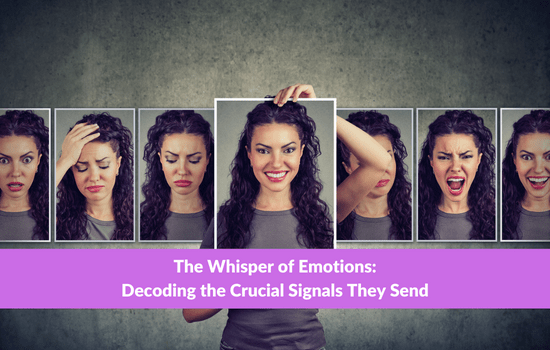From the moment we wake until we close our eyes, we experience various feelings and emotions. Both are vital and communicate helpful messages about the world around us - we must work to understand and not judge them.
The Language of Emotions: Unraveling the Vital Signals Within
Without question, our emotions guide everything we do. They signal crucial messages that impact how we communicate. We must learn to decode them to become more self-aware.
Numerous factors can trigger our emotions, including fear, happiness, circumstances, and even the weather can affect our feelings.

Feelings And Emotions Are Crucial To Communicating Messages?
Feelings and emotions play a crucial role in communication because they add depth, nuance, and authenticity to our messages. They provide a rich layer of non-verbal cues that help convey our words' true meaning and intent. Emotions act as signals, offering insights into our thoughts, attitudes, and reactions, fostering a deeper connection and understanding between individuals. In essence, they enrich the human experience of communication, making it more meaningful and relatable.
What Is The Difference Between Feelings And Emotions?
Feelings and emotions are closely related but distinct. Emotions are brief, intense responses to a specific trigger, while feelings are the conscious experience and interpretation of those emotions. Emotions are more immediate and automatic, while feelings involve cognitive processes and a more subjective experience.
Quit Treating Your Feelings As Good Or Bad
It is unsurprising how many of us treat emotions as good or bad. Good and bad are adjectives we learn soon after birth as we begin to understand the spoken word. Many of us were labelled good or bad as children, depending on our behaviour and circumstances. No wonder we use these two words so automatically.
It's natural and often more straightforward to want to separate good and bad emotions - but if we treat our feelings as good or bad before we consciously feel them, we are judging the emotion instead of understanding what is causing the feeling.
We never want to feel negative emotions, so we often immediately attempt to dismiss the feeling as soon as possible.
Take Time To Recognize, Understand, And Manage Your Emotions
Not judging our feelings and emotions is important because it allows us to acknowledge and understand them without attaching negative labels. Judging emotions can lead to suppression or denial, hindering emotional well-being. Accepting our feelings creates space for self-reflection, growth, and effective coping. It fosters emotional intelligence, helping us navigate challenges and cultivate a healthier relationship with ourselves and others.
Typically, good emotions excite us and create an emotional high. Still, again, if we judge our feelings before we feel them, we don't understand what is causing the emotion, and it stops us from helpfully using the feeling.
For example, have you ever awakened to feel stressed or anxious (both are negative feelings), and when you attempted to pinpoint what was stressing you, you realized it was manageable and not earth-shattering? Have you ever had a day when you felt you could handle anything, but the day before, you couldn't, and you don't understand why? Possibly, it is because you were judging your feelings instead of taking the time to recognize, understand, and manage them.
Remember That Your Emotions Share Information
The next time you feel your emotions taking over, accept them. You will help you begin to get to know and understand them.
If we afford ourselves the time and opportunity to sit with the emotion and become fully aware of it - we can understand what is causing it. Continuing to judge our feelings generates more emotions and reduces the possibility of understanding and working through them. Removing judgment of emotions allows them to run their course and vanish, stopping us from carrying unwanted feelings around.
Once we understand that our feelings impact our emotions and send us vital messages, we become more comfortable with them. This behaviour improves our self-awareness, communication skills, and overall emotional intelligence. For more insight, I encourage you to read my book, The Power of Emotion: A Practical Approach to Making the Most of Your Emotional Intelligence. Consider an EQ-i 2.0 Assessment to learn more about your emotional intelligence.
This article was originally published on November 11, 2017, and has been updated (February 2024).
More Motivational Reads Here »
How Emotionally Intelligent Are You?
Sign up for monthly tips to build your Emotional Intelligence and reduce Emotional Hijacking!

















